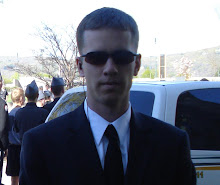I mentioned yesterday about this thing we call the Battle Command Conference. It is officially the "THE CAPSTONE EXPERIENCE IN USMA'S PROFESSIONAL MILITARY ETHIC EDUCATION AND FOCUSES ON BATTLE COMMAND IN THE CONTEMPORARY ENVIRONMENT." It's actually in capital letters, so I think they are really serious about it. And they're calling it the 13th Conference, but I'm calling "bullshit" because last year was the first time I've ever heard of it happening. Maybe they're counting the 11 times it happened back in the 1800's or something.
The one panel that we had today was from 6 leaders from C company, 1-26 Infantry Regiment in the 1st Infantry Division. Kelly Kennedy is an Army Times reporter and recent author of a book (that I've of course put on my Amazon wish list) about C Company's deployment to Iraq in 2006-2007- They Fought For Each Other. Kennedy's website offers this quick run-down of the situation:
"In December 2006, 19-year-old Ross McGinnis threw himself on a grenade to save four friends. He received the Medal of Honor.A Humvee rolled over a roadside bomb, killing two soldiers and severely burning the others. In June, a Bradley hit another bomb, and it killed five soldiers and an Iraqi interpreter.Soon after, a well-loved first sergeant in the battalion, 1SG Jeff McKinney, killed himself in front of his men after not sleeping, eating or drinking for several days. Then, a second Bradley hit a bomb, instantly killing four soldiers. The platoon I embedded with was accused of mutiny after they refused to go out after the second Bradley was hit. They said they feared they would kill everyone they saw if they went out because they were so full of rage. Charlie Company lost 14 men, and Second Platoon came home without nine of their friends."
As you can see, C Company had a really rough deployment. All in all, there were 14 KIAs and 30 WIAs, the price just one company paid in executing the Iraq "surge" (which in case you missed it in the news, because they really didn't report on it much, the surge was hugely successful). It was appropriate for leaders from this company to come and talk to us on the topic of Family Readiness Groups, or FRGs. They are groups composed mostly of families of soldiers that are an official support system for those families while the soldiers are deployed. Before and during the first years of the wars, FRGs were thought of mostly as just army wives meeting and complaining about stuff. Now especially, they really are a well established and legitimate support channel for those who stay home during a deployment. One of the harshest tasks for a FRG is making death and casualty notification, the C Company FRG group unfortunately had lots of practice.
The panel consisted of the company commander, the first sergeant, a platoon leader, a platoon sergeant, the rear detachment-FRG liaison, and the FRG leader (who is many times, and was in this case, the company commander's spouse). I just thought I'd share some of the nuggets of wisdom that they shared.
-one of the FRG's main missions is information flow and rumor control for the families
-if extra units are attached to your company for the deployment, make sure to include their families
-send out a newsletter whenever you can (maybe use a blog?)
-the Army gives your battalion some funding but you might need to fund raise
-it is not an extension of the chain of command, any soldier's spouse could be the leader
-single soldiers should/must be included too, especially their parents
-it is the company commander's program, but if your company doesn't have one don't just sit by and do nothing
-be wary of soldiers getting married 2 weeks before deployments, especially if they don't speak the same language (true story)
-know the families just as well as you know their soldiers
-make sure someone goes to visit the wounded warriors in the hospital
-C Company had a great FRG and the leaders believe that was a huge part of their unusually high re-enlistment rate
-keeping information (especially the bad stuff) from your loved ones isn't healthy, they want to be in the loop and know what you are doing
-and keep an eye even on the upper level leaders, they'll need help too
Subscribe to:
Post Comments (Atom)

No comments:
Post a Comment